15 Healthiest Fast-Food Burgers, According to Dietitians
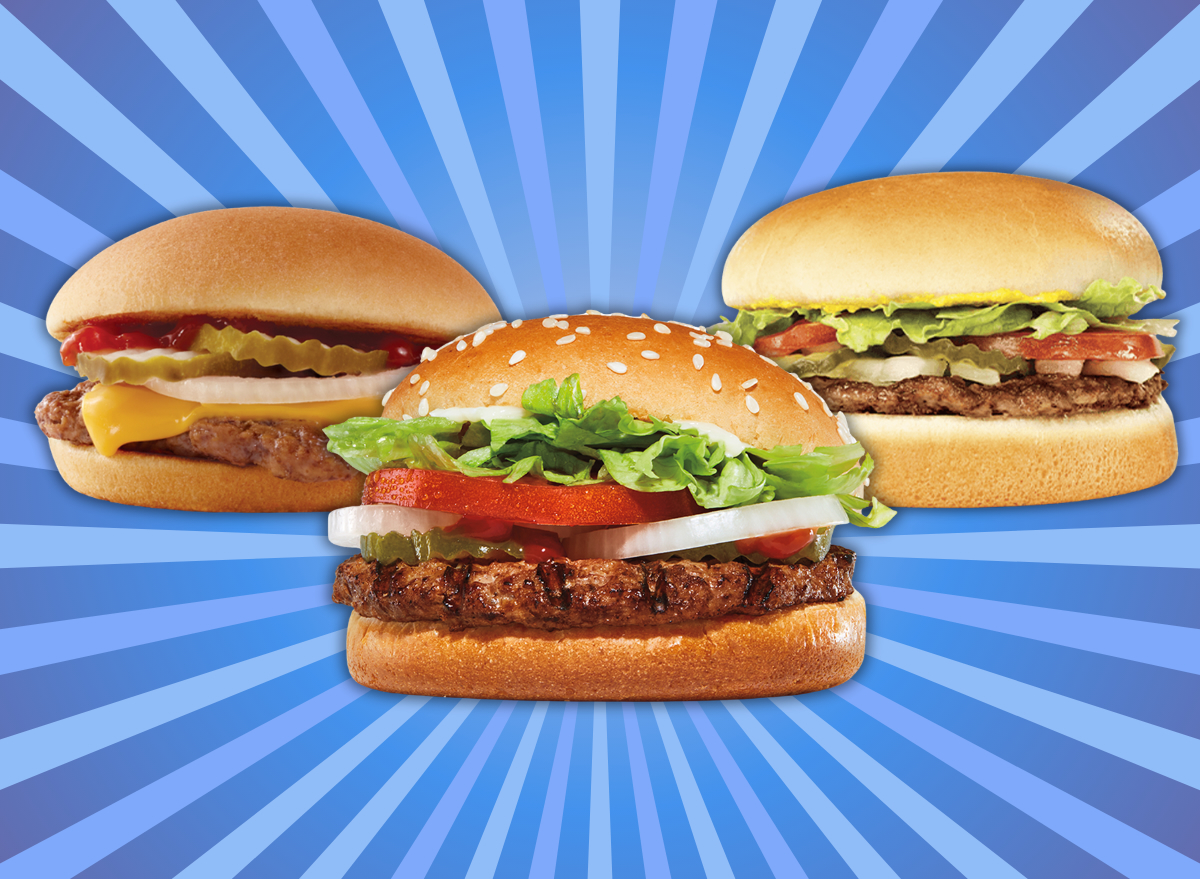
Let's face it—few things are more satisfying than a hot, juicy burger from your favorite fast-food joint. While indulging in these cravings is fine on occasion, choosing the healthiest fast food burger can help you stay on track with your health goals. Though no fast-food burger is truly "healthy," some options pack fewer calories, less fat, and lower sodium than others.
Fast food is a great option when you need a quick, affordable, and convenient meal, or you're just craving a burger; however, experts warn against eating fast food regularly due to its links to health risks like high blood pressure, high cholesterol, and heart disease. In these moments, choosing one of the healthiest fast food burgers can strike the right balance between indulgence and mindfulness.
We asked dietitians to share their top picks for the healthiest fast food burgers. Ready to see which ones made the list? Keep reading—and check out these 7 Unhealthiest Fast-Food Burgers That Can Pack on Pounds—And 7 Healthier Options.
How To Order the 'Healthy' Fast-Food Burgers
Making smart choices when ordering fast food can help you enjoy a burger while keeping calories, fat, and sodium in check.
"You'll notice a trend on the list that isn't surprising—single burgers without all the fixings, cheese, extra meat, etc. because these are best when it comes to keeping calories, fat, saturated fat, and sodium in check," say Tammy Lakatos Shames, RDN, CDN, CFT, and Lyssie Lakatos, RDN, CDN, CFT, also known as The Nutrition Twins.
Here are a few expert-approved tips to order the healthiest fast-food burger:
- Limit toppings: Skipping high-calorie toppings like bacon, fried onion rings, and even cheese can significantly lower fat, calories, and sodium. These add-ons are calorie-dense and quickly turn a simple burger into a less nutritious option.
- Stick to single patties: While additional patties increase protein, they also come with extra calories and fat—including saturated fat—from the red meat. If you're ordering a cheeseburger, a double patty often means an additional slice of cheese as well, which adds even more fat and calories.
- Minimize sauces: Most fast food burgers come with default sauces like mayo or BBQ sauce, which can add hundreds of unnecessary calories. Customizing your order to leave off higher-calorie sauces is an easy way to lighten your meal. For example, mayonnaise can add over 100 calories, while mustard is a lighter option at around 30 calories.
Burger King Hamburger
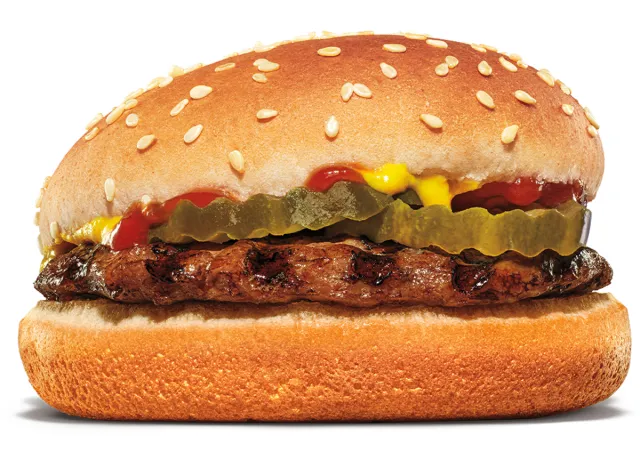
Calories: 250
Fat: 10 g (Saturated Fat: 4 g)
Sodium: 560 mg
Carbs: 29 g (Fiber: 1.1 g, Sugar: 7.1 g)
Protein: 13.1 g
"The regular hamburger at Burger King offers a relatively moderate calorie count of 250 calories, making it a reasonable option for those looking to manage their calorie intake," says Mary Sabat MS, RDN, LD. "Additionally, the burger provides 13 grams of protein, which is crucial for muscle maintenance and satiety."
One thing that Sabat notes about this burger is that even though the sodium here is lower than many other fast-food burgers, "the sodium content is still 560 milligrams, which contributes significantly to daily sodium intake and may need to be considered, especially for those watching their sodium intake for health reasons."
Wendy's Jr. Cheeseburger
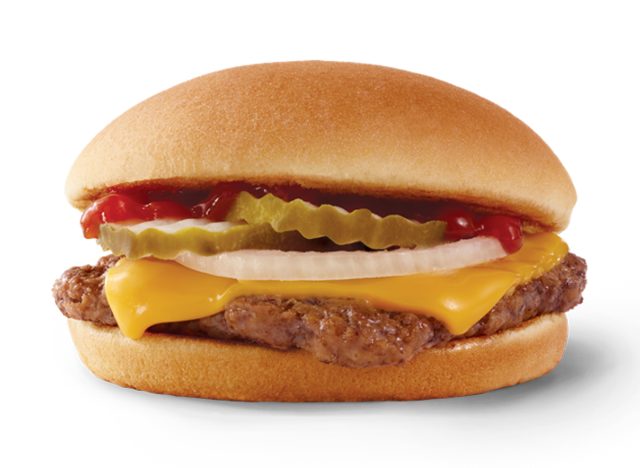
Calories: 290
Fat: 14 g (Saturated Fat: 6 g)
Sodium: 610 mg
Carbs: 26 g (Fiber: 1 g, Sugar: 6 g)
Protein: 14 g
Wendy's has plenty of fancy burger options like their Bourbon Bacon Cheeseburger or their infamous Dave's Triple. However, you can find some healthier options at this fast food joint, as well.
"At under 300 calories (290 to be exact), the Wendy's Jr. Cheeseburger has less than half of the calories of most burgers, so there's still wiggle room to amp up some nutrients by ordering a side salad," say the Nutrition Twins. "While the sodium and saturated fat in this cheeseburger aren't that low, they are lower than you'd find in many other burgers. If you skip the pickles and go light on the ketchup and mustard, you can drop the sodium significantly."
McDonald's Hamburger
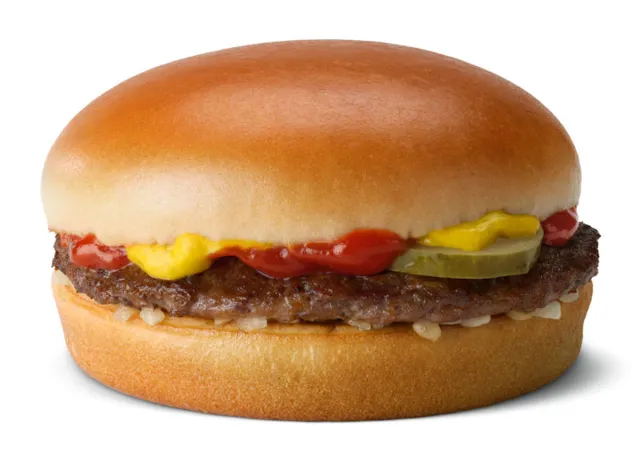
Calories: 250
Fat: 9 g (Saturated Fat: 3.5 g)
Sodium: 510 mg
Carbs: 31 g (Fiber: 1 g, Sugar: 6 g)
Protein: 12 g
You can certainly find plenty of heavy, unhealthier menu items at McDonald's, but for a lower-calorie, lower-fat burger, their regular hamburger is an easy choice.
"This McDonald's Hamburger tops the list when it comes calories, saturated fat, and sodium," say the Nutrition Twins. "Add apple slices or a healthy side from your own house to step up the fiber, antioxidants, and nutrients."
However, they add that"this burger's biggest shortcoming is that it only contains 12 grams of protein, and you want to aim for at least 20 grams of protein per meal."
Burger King Whopper Jr.
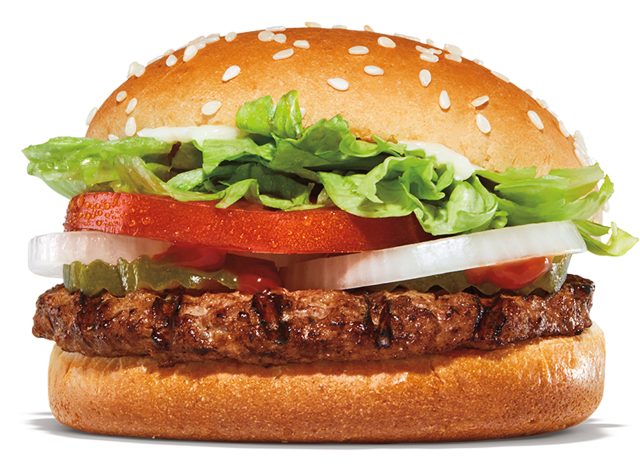
Calories: 334
Fat: 18 g (Saturated Fat: 5 g)
Sodium: 601 mg
Carbs: 30 g (Fiber: 2.5 g, Sugar: 8 g)
Protein: 17 g
If you want a healthier burger option at Burger King but want a few more veggies than the regular hamburger, try the Whopper Jr. instead.
"Fairly close in nutrition stats compared Wendy's Jr. cheeseburger, this burger has 334 calories, so it doesn't break the calorie bank," say the Nutrition Twins. "While the calories are slightly higher than the Wendy's burger, the sodium is slightly lower, as well as the saturated fat."
They also add that this burger has "17 grams of satisfying protein," which can help keep you full longer.
Whataburger Jr.
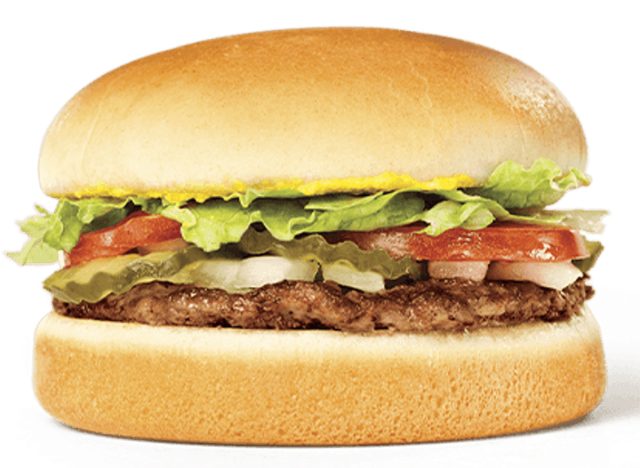
Calories: 310
Fat: 11 g (Saturated Fat: 3 g)
Sodium: 750 mg
Carbs: 37 g (Fiber: 2 g, Sugar: 6 g)
Protein: 14 g
With only 310 calories, the Whataburger Jr. is an easy choice for those wanting a lower-calorie fast-food option. Not only that, but Sabat says "the Whataburger Jr. provides a decent balance of macronutrients, with 14 grams of protein and 11 grams of fat, and this combination of protein and fat helps promote satiety and keeps hunger at bay for longer periods."
When you order this Jr. burger instead of something heavier like the Triple Meat Whataburger—which has over 1,000 calories—you'll be able to enjoy the taste and convenience of a fast-food while still staying in line with some of your health goals.
Culver's Original ButterBurger

Calories: 390
Fat: 17 g (Saturated Fat: 7 g)
Sodium: 480 mg
Carbs: 38 g (Fiber: 1 g, Sugar: 6 g)
Protein: 20 g
Culver's is arguably most known for its frozen custard, but their ButterBurger is delicious and not too shabby when it comes to nutritional value. Compared to many other fast food burgers, this one is lower in calories, as well as total and saturated fat. It is especially low in sodium and the second lowest on our list, right behind the Five Guys Little Hamburger. Another benefit of ordering this one is the 20 grams of protein per sandwich.
Jack in the Box Jr. Jumbo Jack
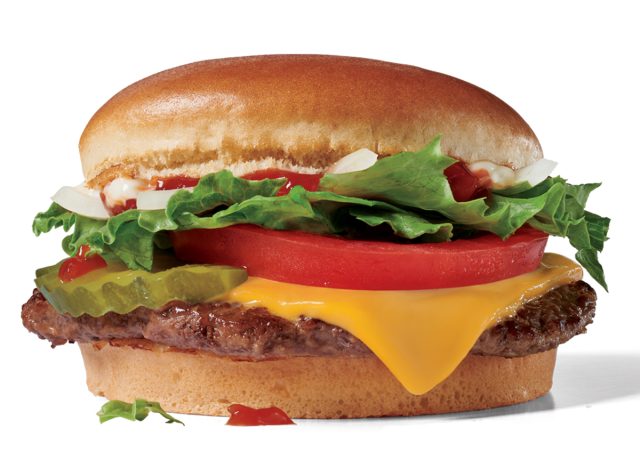
Calories: 400
Fat: 25 g (Saturated Fat: 6 g)
Sodium: 700 mg
Carbs: 31 g (Fiber: 1 g, Sugar: 5 g)
Protein: 14 g
"The Jr. Jumbo Jack (without cheese) at Jack in the Box emerges as a favorable option for those seeking a lighter choice when indulging in fast food," says Sabat. With 400 calories, 25 grams of fat, 6 grams of saturated fat, and 14 grams of protein, this burger has a better nutritional balance than many other fast-food burger options around. And when it comes to Jack In The Box menu items specifically, this is one of the healthiest choices you can make.
In-N-Out Hamburger With Onion
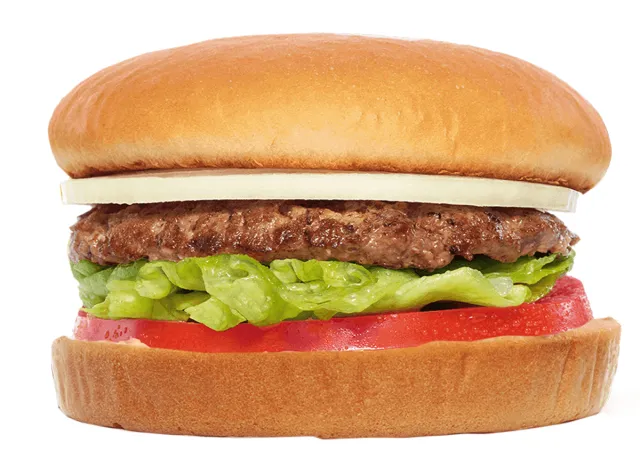
Calories: 390
Fat: 19 g (Saturated Fat: 5 g)
Sodium: 650 mg
Carbs: 39 g (Fiber: 3 g, Sugar: 10 g)
Protein: 16 g
"It may not be the most decadent choice on the menu, but the single patty hamburger without cheese is a fast-food burger with a solid nutrition profile," says Sydney Greene, MS, RDN. "I typically recommend someone aim to have at least 15 grams of protein in their meal and anywhere from 10-20 grams of fat, so this burger is spot on."
According to Greene, you can also replace the hamburger bun with lettuce, to improve the nutritional value even more.
Shake Shack Hamburger
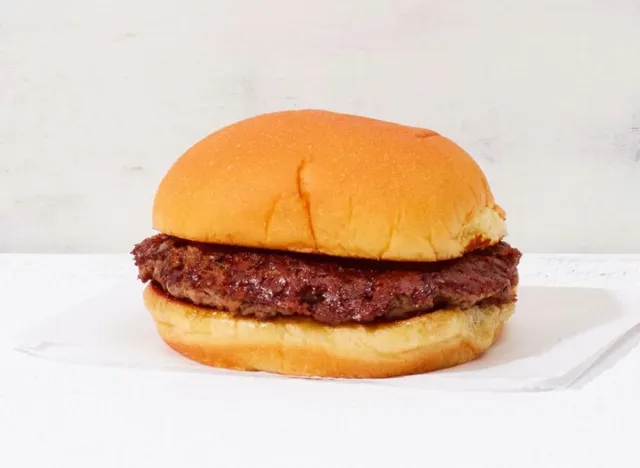
Calories: 370
Fat: 18 g (Saturated Fat: 8 g)
Sodium: 850 mg
Carbs: 24 g (Fiber: 0 g, Sugar: 5 g)
Sometimes you just need to treat yourself to a burger at Shake Shack with cheese fries and a famous malt shake. However, if you're looking for a lighter option, try a regular Shake Shack Hamburger—and pass on the shake.
"Shake Shack uses fresh ingredients and 100% all-beef patties made in-house with a wide selection of vegetable toppings and a lettuce bun alternative," says Amy Goodson, MS, RD, CSSD, LD. A downside that Goodson points out is that this burger is still on the higher end of calories and total fat.
Five Guys Little Hamburger

Calories: 540
Fat: 26 g
Sodium: 380 mg
Carbs: 39 g
"The Little Hamburger provides one patty versus the standard two and is made with fresh in-house patties without additives," says Goodson. "You have the bonus of adding any toppings you want, and I recommend lettuce, tomatoes, and grilled onions to add a bit of color and nutrients."
To make this among the healthiest of fast-food burgers, you can also replace the bun with lettuce, which adds even more nutritional value and cuts some of your carbohydrates.
Steak n Shake Single Steakburger
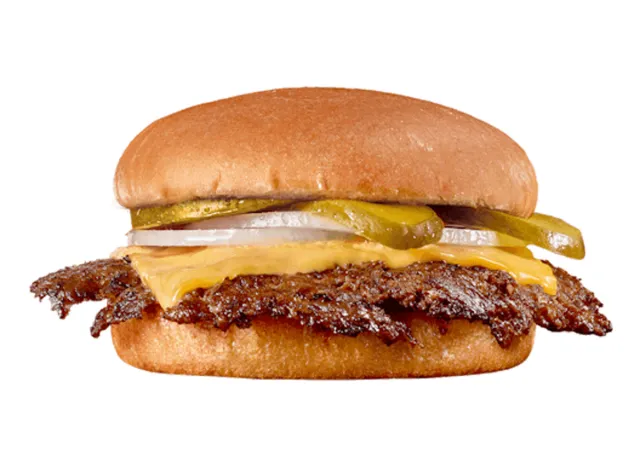
Calories: 320
Fat: 14 g (Saturated Fat: 5 g)
Sodium: 820 mg
Carbs: 32 g (Fiber: 3 g, Sugar: 6 g)
Protein: 15 g
The Steak 'n Shake Steakburger (without cheese) is one of the lower-calorie options on the list and is also fairly mild in saturated fat compared to most fast food burgers. The famous fries at Steak n Shake are obviously what they're most known for (that and their shakes, of course), but to keep this meal relatively "healthy," you may want to pass on those and just stick to the burger.
BurgerFi Single Burger
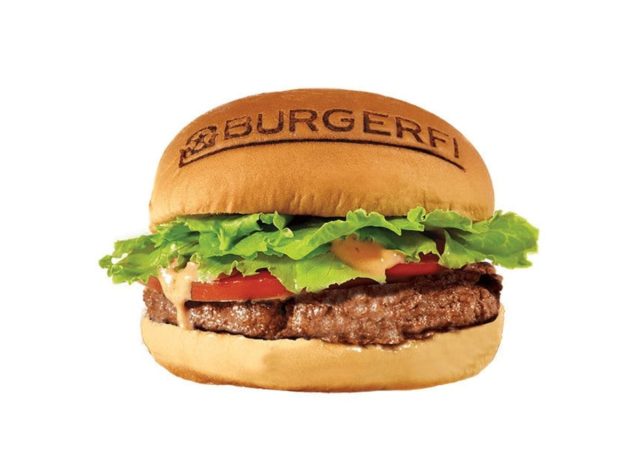
Calories: 510
Fat: 29 g (Saturated Fat: 10 g, Trans Fat: 1 g)
Sodium: 640 mg
Carbs: 28 g (Fiber: 4 g, Sugar: 9 g)
Protein: 37 g
BurgerFi is known for using grass-fed beef and cleaner ingredients, but this fast-food restaurant still has its fair share of calorie-laden, sodium-heavy menu options, like their Ultimate Bacon Cheeseburger, CEO Burger, or their BBQ Rodeo Burger—which is two burger patties piled high with crispy fried onions, cheese, and barbecue sauce. The good news is that you can find some lighter alternatives here as well, such as their simple BurgerFi Burger.
"With just 510 calories, this burger offers a moderate calorie count, making it suitable for those conscious of their intake, but what truly sets it apart is its impressive protein content of 37 grams, derived from the high-quality sources used, contributing to muscle maintenance and satiety," says Sabat. "Additionally, the inclusion of 4 grams of fiber aids in digestion and promotes feelings of fullness."
BurgerFi VegiFi Burger
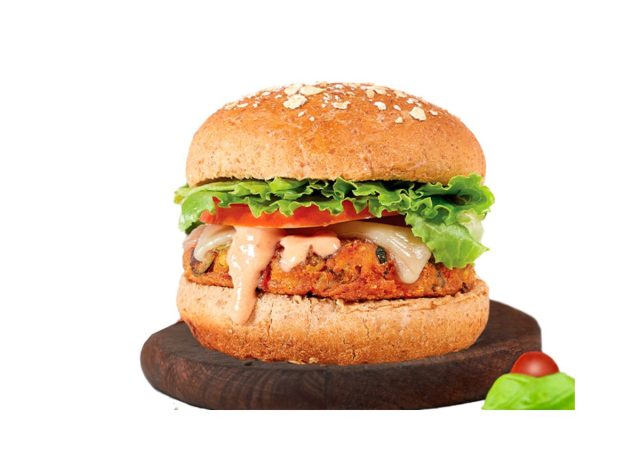
Calories: 520
Fat: 25 g (Saturated Fat: 9 g)
Sodium: 820 mg
Carbs: 57 g (Fiber: 7 g, Sugar: 11 g)
Protein: 18 g
Veggie burgers at fast-food chains can be hit or miss when it comes to nutrition, but the VegiFi Burger from BurgerFi made it on our list for a number of reasons.
"With 520 calories, it offers a satisfying meal without excessive calorie intake, and what really sets this veggie burger apart is its impressive protein content of 18 grams, which is notably high for a plant-based burger," says Sabat. "This substantial protein content not only contributes to feelings of fullness and satiety but also supports muscle maintenance and repair. Additionally, with 7 grams of fiber, this veggie burger provides a significant boost in dietary fiber, aiding in digestion and promoting overall gut health."
Sabat notes, "By opting for this burger, individuals can effectively reduce their meat consumption while still enjoying a filling and nutritious meal."
Shake Shack Shroom Burger
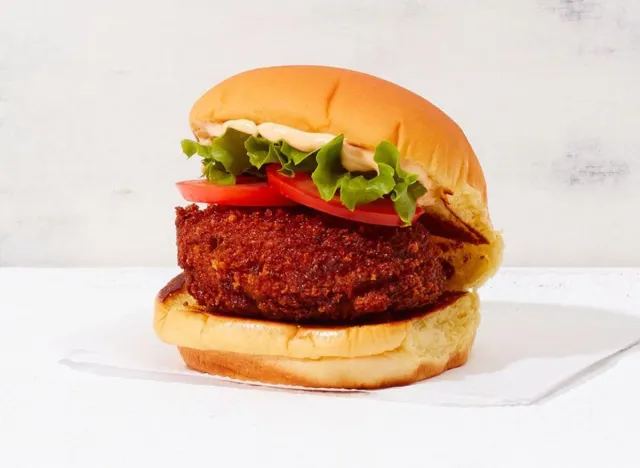
Calories: 510
Fat: 27 g (Saturated Fat: 10 g)
Sodium: 670 mg
Carbs: 49 g (Fiber: 0 g, Sugar: 7 g)
Speaking of fresh ingredients from Shake Shack, if you're into a non-meat take on a fast food burger, you'll love the restaurant's Shroom Burger option.
"With all of the fake meats popping up on fast food menus, a burger that is made out of portobello mushroom is a breath of fresh air," says Greene. "This 'burger' also has significantly less sodium than some of the other Shack burgers."
Elevation Single Burger

Calories: 330
Fat: 14 g (Saturated Fat: 6 g)
Sodium: 520 mg
Carbs: 29 g (Fiber: 1 g, Sugar: 4 g)
Protein: 23 g
Elevation Burger is a smaller, lesser-known burger franchise than something like Burger King or McDonald's, but this northeastern fast-food restaurant makes one of the healthiest fast-food burgers that's also delicious. If you find yourself at one of its locations in New York, Maine, Maryland, Virginia, or D.C., you'll have a few lighter burger options to choose from, like the
"With just 330 calories, the Single Burger offers a considerable 23 grams of high-quality protein, which is essential for muscle maintenance and satiety," says Sabat. Not only that, but the saturated fat (6 grams) and sodium (520 milligrams) content are both lower than many other popular fast-food burgers.









